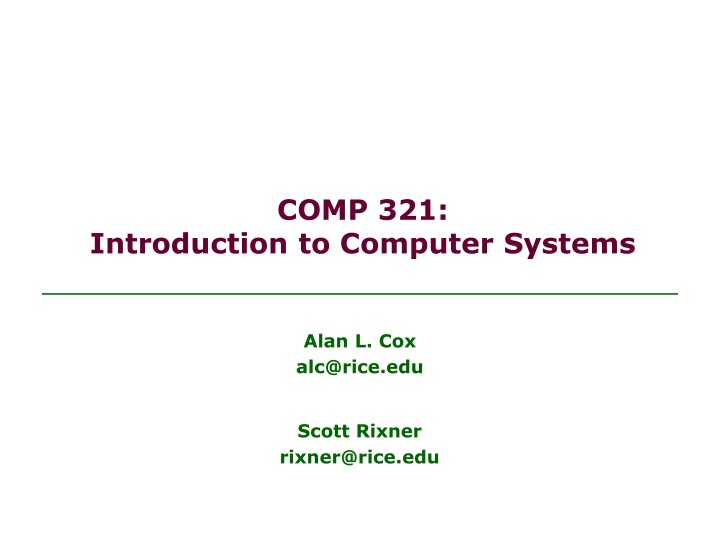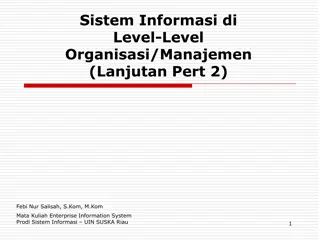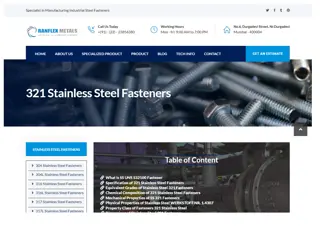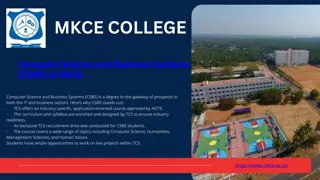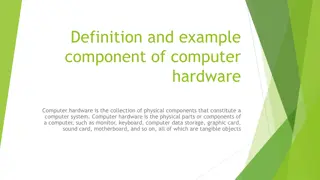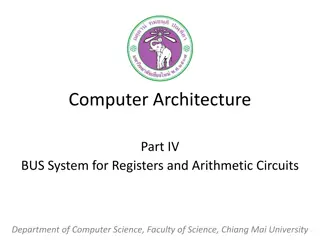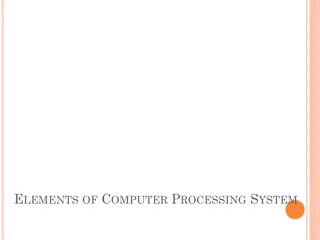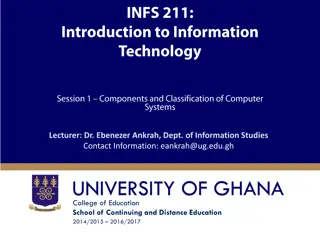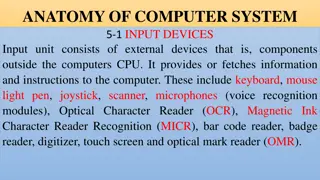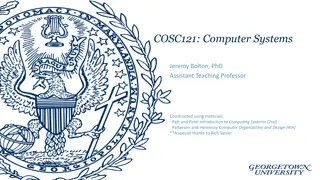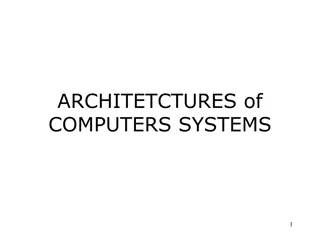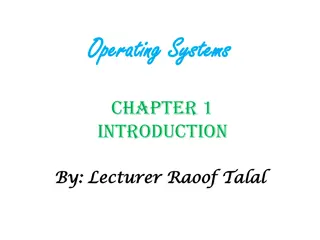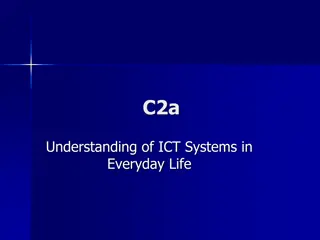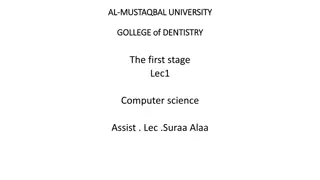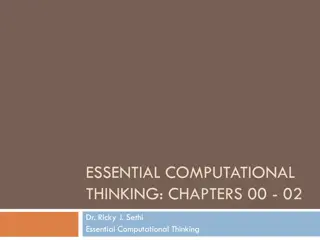Introduction to Computer Systems - COMP.321 Overview
This course provides an in-depth understanding of computer systems, focusing on programming, exceptions, memory, I/O, networking, and system classes. Students learn about computer architecture, compilers, operating systems, and security. With a blend of theory and practical applications, the course covers hardware/software interfaces, low-level software manipulation of hardware, and the use of C language to access system resources. Emphasis is placed on the importance of C in interfacing with run-time and operating systems for low-level programming, bug management, program efficiency, and system software implementation.
Download Presentation

Please find below an Image/Link to download the presentation.
The content on the website is provided AS IS for your information and personal use only. It may not be sold, licensed, or shared on other websites without obtaining consent from the author.If you encounter any issues during the download, it is possible that the publisher has removed the file from their server.
You are allowed to download the files provided on this website for personal or commercial use, subject to the condition that they are used lawfully. All files are the property of their respective owners.
The content on the website is provided AS IS for your information and personal use only. It may not be sold, licensed, or shared on other websites without obtaining consent from the author.
E N D
Presentation Transcript
COMP 321: Introduction to Computer Systems Alan L. Cox alc@rice.edu Scott Rixner rixner@rice.edu
Goals Understand programming better Linking Exceptions Memory I/O Networking Prepare for systems classes Computer architecture Compilers Operating systems Networking Security Cox COMP 321 Overview 2
Computer Organization Hardware/software interface (ELEC 220) Basic hardware organization of computer systems Assembly language How low-level software manipulates hardware state System/application interface (COMP 321) Abstract hardware organization C language (one step above assembly language) How to use operating system services to access system resources Cox COMP 321 Overview 3
Why use C? Interfacing with run-time and operating systems is more suited to low-level programming Much of the software that you use is written in C Understanding C and assembly is key to understanding how programs execute Behavior of programs in presence of bugs High-level language model breaks down Tuning program performance Understanding sources of program inefficiency Implementing system software Compiler has machine code as target Operating systems must manage process state Cox COMP 321 Overview 4
Problems in Low-Level Programming It s easy to make mistakes When you do, you re out of luck Imperative programming Few abstractions No objects, abstract functions, ... No safety net Direct access to system resources Manual memory management Cox COMP 321 Overview 5
Programming Survival Skills Planning Good style & documentation Defensive programming Debugging Cox COMP 321 Overview 6
What this course is not This is not a course about the art of programming Other courses have/will cover programming principles (e.g., COMP 215, 318, ) This is not a course about the C language You will gain a familiarity with C There are many C concepts that we will not discuss We will not cover large-scale program design in C C is simply a useful vehicle for learning system-level concepts Cox COMP 321 Overview 7
Course Perspective Upper-level systems courses teach how systems work so you can build them Computer architecture How does a microprocessor work? Compilers How does a compiler work? Operating systems How does an operating system work? Networking How do network protocols work? Security How does SSL/TLS work? Cox COMP 321 Overview 8
Course Perspective This course teaches how to use systems Purpose is to show how by knowing more about the underlying system, one can be more effective as a programmer Enable you to Write programs that are more reliable and efficient Incorporate features that require hooks into OS E.g., concurrency, signal handlers This course covers some material that you won t see elsewhere Cox COMP 321 Overview 9
Syllabus Overview Machine-level representation of programs Assembly to C Linking and Virtual Memory How does a program actually get loaded and run? Exceptions Critical events can happen outside your program I/O, Networking, and Concurrency Programs must communicate to be useful Cox COMP 321 Overview 10
Linking Libraries What are they? How are they used by your program? Incremental compilation How can you minimize recompilation? How are 100 s of files combined into one program? Errors Why does your program compile but not run? Why does Windows tell you that <blah>.dll is out of date ? Cox COMP 321 Overview 11
Virtual Memory Address spaces What does a program s address space look like? How are programs loaded into memory? How are programs isolated and protected from each other? How do programs share memory? Allocating memory Where is your program s data stored? What if you need more memory? How is this allocation managed? Cox COMP 321 Overview 12
Exceptions Running programs How does the shell work? What is a process, and how is it created? Communicating with a program What happens when you type Ctrl-C, Ctrl-Z, etc.? How does your program find out about external events? System calls What happens to your program when you invoke the operating system? Cox COMP 321 Overview 13
I/O, Networking, and Concurrency I/O interface How are files read, written, shared, etc.? Which I/O functions should you use and why? Network access Who manages the network? How can your program access the network? Concurrency What are some of the problems with concurrency? How are concurrent programs written? Cox COMP 321 Overview 14
Exposure to Real Programs Over the course of the semester you will be exposed to several real programs Shell You will write pieces of a functioning Unix shell Dynamic memory allocator You will write a functioning memory allocator And more Cox COMP 321 Overview 15
Logistics Lectures: TR 2:30-3:45 PM KCK 100 Labs: W 2:00-3:15 PM or 3:30-4:45 PM PCF 4 Lecturers: Alan L. Cox and Scott Rixner TAs: See web page Web page: https://www.clear.rice.edu/comp321/ Announcements: On Piazza Textbook: Computer Systems: A Programmer s Perspective, 3rd Ed. by Bryant and O Hallaron Cox COMP 321 Overview 16
Weekly Labs Emphasis C programming, debugging In-depth hands-on exercises General programming tips Other cool topics in computer systems as time permits Requires access to CLEAR servers Go to http://apply.rice.edu/ for an account Requires a GitHub account Cox COMP 321 Overview 17
Labs Everyone should do the labs You should treat labs like lectures Many key concepts needed by assignments will be covered in labs Especially crucial for those who have never programmed in C And for those who have not programmed in a Unix environment Extra credit for turning in the labs on time Requirements for receiving extra credit will be detailed in the first lab Cox COMP 321 Overview 18
Assignments/Exams Assignments all involve programming 6 assignments throughout the semester First 2 are to get you familiar with C programming Last 4 are to teach the course concepts and assume you are comfortable with C An introductory book on C may be helpful, e.g., Head First C Comprehensive in-person registrar-scheduled exam during finals period No quizzes or exams during the semester Cox COMP 321 Overview 19
Assignment Policies Carefully read the assignments web page Honor code policy Slip day and regrade policies All assignments will be posted on the web page Assignments are due at 11:55PM on the due date, unless otherwise specified Assignments must be done on CLEAR servers Other systems may behave differently! Cox COMP 321 Overview 20
Next Time Begin introduction to C Lab this week will show some basic C programs Start with simple data types First programming assignment to get everyone familiar with C Cox COMP 321 Overview 21
